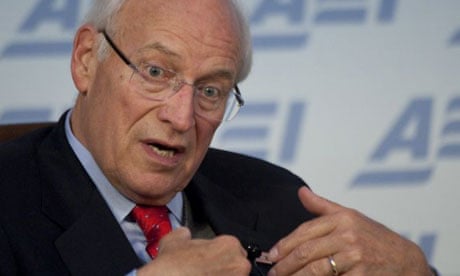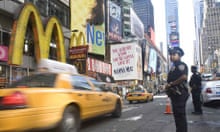Dick Cheney, the former US vice-president, has claimed Osama bin Laden would not have been tracked down and killed if it had not been for information gathered by torturing captured al-Qaida leaders.
In a robust defence of what he called "enhanced interrogation", Cheney said it produced "phenomenal" results and dismissed the Obama administration's investigations of its legality as "objectionable" and a "terrible precedent".
Speaking ahead of ceremonies to mark the 10th anniversary of the 9/11 attacks, the former vice-president rejected accusations that the use of torture undermined the moral authority of the US overseas.
"The notion that somehow the United States was wildly torturing anybody is not true," he said. "One of the most controversial techniques is waterboarding ... Three people were waterboarded. Not dozens, not hundreds. Three. And the one who was subjected the most often to that was Khaled Sheikh Mohammed, and it produced phenomenal results for us."
Khaled Sheikh Mohammed is awaiting trial before a US tribunal accused of being the architect of the 9/11 attacks.
But while Cheney, who was appearing at a question and answer session at the conservative American Enterprise Institute to promote his new memoir, In My Time, insisted only a small number of men were subjected to "enhanced interrogation", he made no mention of the rendition programme in which the US abducted individuals and handed them over to a third country for questioning under torture.
Cheney said that waterboarding Khaled Sheikh Mohammed "helped produce the intelligence that allowed us to get Osama bin Laden".
"It was out of the enhanced interrogation techniques that some of the leads came that ultimately produced the result when President Obama was able to send in Seal Team 6 to kill Bin Laden," he said.
"They've been successful in part because of the capabilities we left them with, the intelligence we left them with, because of what we learned from men like Khaled Sheikh Mohammed back when he was subjected. I think it's a mistake not to have an enhanced interrogation programme available now. I don't know what they would do today if they captured the equivalent of Khaled Sheikh Mohammed."
Obama administration officials and Dianne Feinstein, head of the Senate intelligence committee, have denied Bin Laden was tracked down using information gained from waterboarding of Khaled Sheikh Mohammed.
Earlier this week, Eliza Manningham-Buller, the former head of Britain's domestic intelligence service, MI5, repudiated the use of waterboarding as torture and illegal even if, she said, it did produce valuable intelligence.
"It is a sadness and worse that the previous government of our great ally, the United States, chose to waterboard some detainees. The argument that life-saving intelligence was thereby obtained, and I accept that it was, still does not justify it," she said.
"Torture should be utterly rejected even when it may offer the prospect of saving lives".
Manningham-Buller said that not only are there legal and moral issues but that torture encouraged radicalisation and disenchantment.
In defence of the controversial methods, Cheney said they had previously been used on American military personnel and therefore could not be that bad.
"All of them had been used in training for a lot of our own specialists in the military area. So there wasn't any technique that was used on any al-Qaida individual that hadn't been used on our own troops first," he said.
The former vice-president took a swipe at former administration officials who have since sought to distance themselves from the decision to use waterboarding. Colin Powell, the secretary of state at the time, has said there was no meeting at which the use of such methods was officially endorsed.
"The president signed up to it as did the other members of the national security council. Some of my colleagues may have forgotten that but in fact everybody who was a member of the national security council was informed about the essence of the programme and signed up to it," he said.
Cheney said justice department officials had been "severely harassed" for offering legal opinions that waterboarding and other tortures did not breach the Geneva Conventions and were legal.
"One of the things I've found most objectionable with respect to the Obama administration when they came in was the initial decision by the president and attorney general that they were going to investigate and prosecute the people in the intelligence community who had carried out this interrogation programme at our direction. I thought that was a terrible precedent to set," he said.
The investigation went ahead but no prosecutions resulted.


